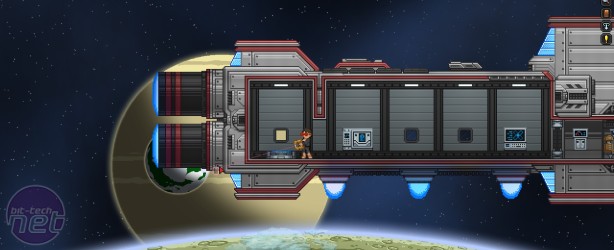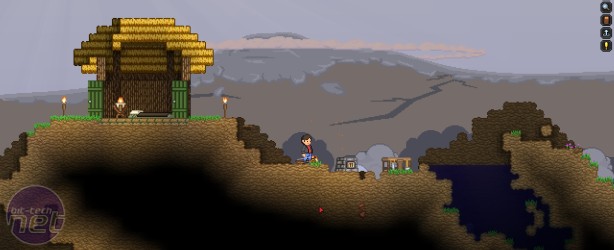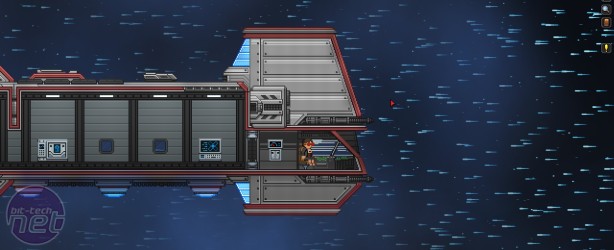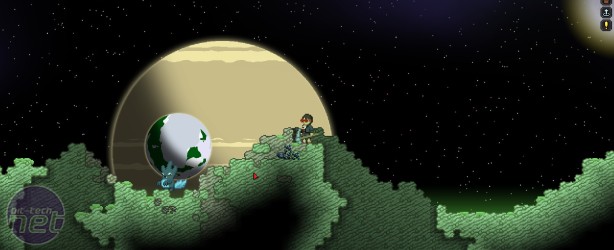
Starbound Early Access Review
Developer: Chucklefish GamesPublisher: Chucklefish Games
Price: £11.99
Note: Early Access Reviews are critical appraisals of games still in development which are charging money for player access to their alpha and beta stages. This review is intended to give you an idea of whether the game is currently worth investing in, but without offering a final verdict.
Do you remember the space-stage of Spore, where an oversimplified and repetitive click-a-thon suddenly opened up into an equally oversimplified and repetitive click-a-thon, but set within an enormous galaxy map that was genuinely breathtaking for the five minutes before you remembered how shallow and bothersome the rest of the game was? It had so much potential, and despite the game's obvious problems, offered a glimpse into the future of what games might possibly be - virtual universes with no boundaries beyond the remaining space of your hard drive.
Chuckefish's Starbound has a similarly grand vision, but is different in the fact that it is already succeeding where spore failed. Providing an equally vast space to explore, but adding in the crucial elements that spore lacked: depth and detail.
Starbound is a two-dimensional exploration and crafting game set in a boundless procedurally generated universe where every moon orbiting every planet orbiting every star can be visited, colonised, and plundered for its natural resources and hidden treasures. Well, almost. Gas giants can't be walked upon for obvious reasons. But any planet that doesn't consist entirely of fart is viable for a bit of interstellar prospecting.
The success of the game relies heavily on the extent to which it can make these planets varied and worth investigating, and so far it has impressed in this regard. To start with, there are several types of planets, including verdant forest worlds, desolate snow-spheres and eerie, airless moons. But each planet has its own distinctive colour palette, procedurally generated flora and fauna, and unique points of interest beyond that.
Regardless of how harsh its environment, every planet supports its own wildlife. Animals we've encountered include flying koalas that fire streams of deadly bubbles from their noses, and squat dog-like creatures that whinny like a horse and projectile-vomit poisonous blood at you (Starbound seems to have a thing for the bodily ejections of animals). Such literally humorous encounters and equally incredulous dangers aren't restricted to Starbound's critters either. One planet we explored suffered frequent and devastating meteor showers, which came as a rather unpleasant surprise having only just finished building a house on the surface. The planet after that seemed relatively unspectacular, until we discovered a vast, Egyptian-style temple guarded by sentient bird-creatures, and an abandoned "Thought Reassignment " compound.
Starbound is reminiscent of Star Trek in that every planet is unpredictable; its own self-contained adventure. It also masks well the "cookie-cutter" feel that can afflict procedurally generated games. While there are obvious themes between planet types, each feels sufficiently different from the one before. Whether Starbound can continue to surprise and delight in this way after thirty to fifty hours of play is another question entirely, but hopefully the relatively simple 2D pixel-art design means Chucklefish have been able to concentrate on cramming the game with as much content as possible.
Exploration is definitely where Starbound is at its strongest, but it's by no means the only string to its bow. Accruing resources, crafting and building are crucial to surviving even Starbound's least hazardous planets. From the start players are equipped with a "matter manipulator" which can be used to both mine and place the many types of block that make up the game's worlds. Building structures is a simple case of left-clicking to place blocks in the foreground, and right-clicking to place blocks in the background, the latter primarily used for filling out the backs of houses and so forth.

MSI MPG Velox 100R Chassis Review
October 14 2021 | 15:04













Want to comment? Please log in.